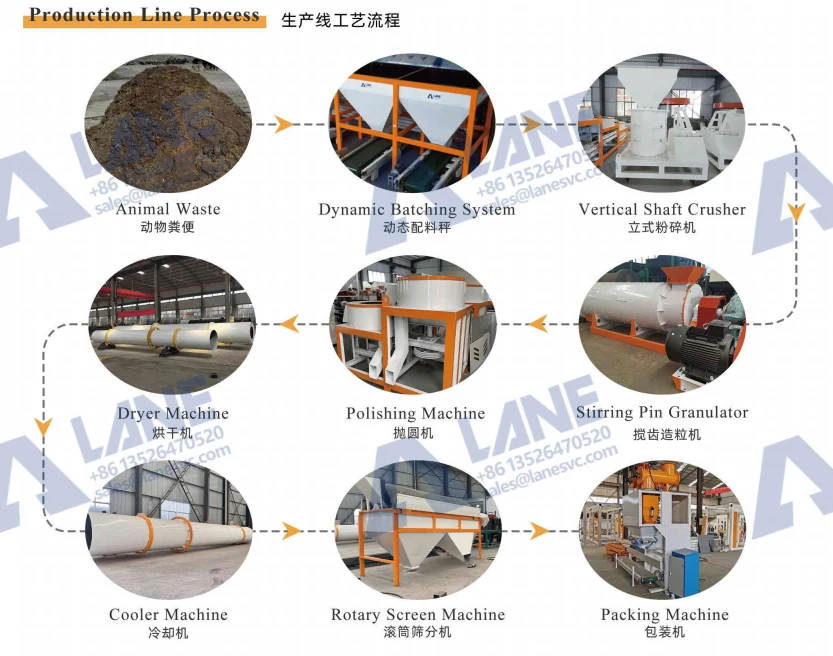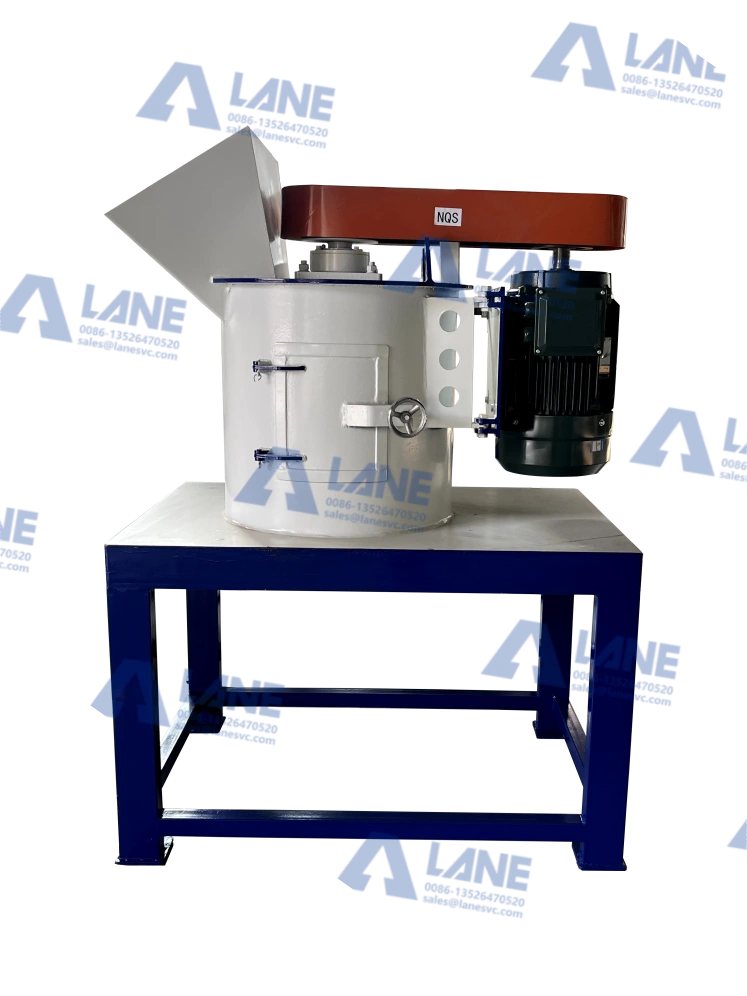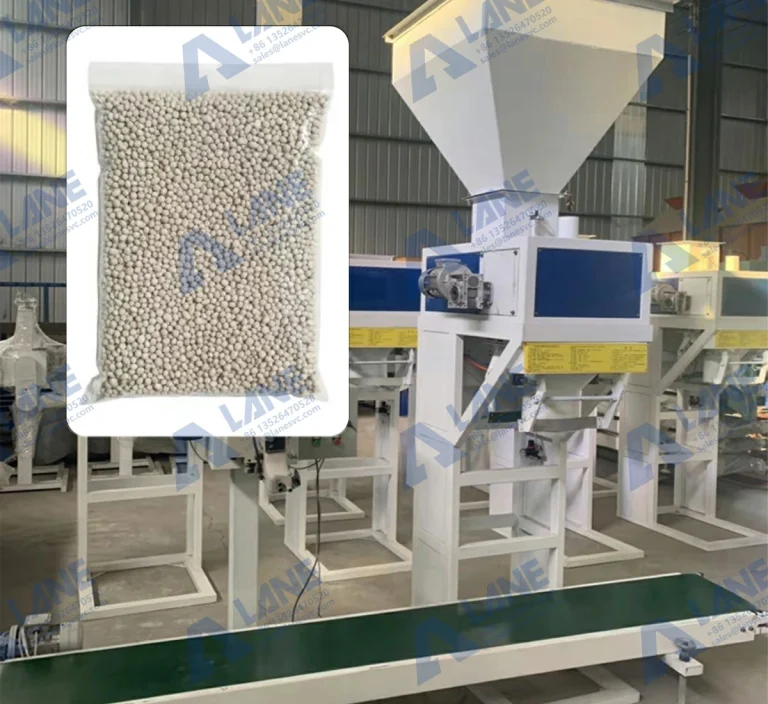The concept of a low-cost organic fertilizer granulation line has become increasingly important in global agriculture. Farmers, cooperatives, and agribusinesses are searching for practical solutions to manage waste while producing affordable, high-quality fertilizer. Instead of viewing animal manure, crop residues, or food processing byproducts as environmental burdens, modern producers are turning these raw materials into valuable organic fertilizer granules.
A low-cost organic fertilizer granulation line offers the perfect balance between affordability and performance. It is designed to minimize investment while delivering reliable results, making it ideal for small to medium-sized farms and enterprises. With the expertise and equipment from LANE, producers can establish efficient production systems that turn waste into wealth.

Why Choose a Low-Cost Organic Fertilizer Granulation Line?
Affordability Meets Functionality: The investment is significantly lower compared to large-scale industrial plants, yet it covers all critical processes—from raw material handling to packaging.
Waste Utilization: Manure, crop straw, sugarcane bagasse, and other organic residues can all be processed efficiently, reducing environmental risks while creating a profitable product.
Market Opportunities: The organic food market is expanding globally. Producing organic fertilizer opens doors to new customers, from local farmers to export markets.
Scalability: Modular designs allow producers to start with a small-scale low-cost organic fertilizer granulation line and expand later as demand grows.
Key Components of a Low-Cost Organic Fertilizer Granulation Line
A well-designed low-cost organic fertilizer granulation line follows a clear sequence of operations. Each machine is vital in transforming raw animal waste into uniform, high-quality fertilizer granules. Based on LANE’s optimized process, the production flow includes the following stages:
(1) Animal Waste (Raw Material Input)
The line starts with raw manure or organic waste such as cow dung, chicken litter, or pig slurry.
This material is rich in nutrients but unsuitable for direct application due to pathogens, odors, and unstable properties.
This system automatically weighs and mixes raw materials according to set formulas. It ensures that nutrients are balanced by blending manure with additives like crop residues, humic acid, or trace minerals. Precise batching guarantees consistent fertilizer quality, reducing variability across production batches.
Large clumps or unfermented material are broken down into fine particles. Crushing improves mixing efficiency and ensures raw materials are ready for granulation. The vertical shaft design provides high throughput at relatively low energy consumption.

This is the core of the line, where loose powdery materials are shaped into uniform granules. The granulator combines high-speed mechanical stirring with aerodynamic force to create dense, rounded granules with good strength. The result is fertilizer that is easy to apply, transport, and store.
Freshly granulated particles may have rough surfaces or irregular shapes. The polishing machine rounds them into smooth, visually appealing granules, improving both market value and user experience.
Moisture content in raw granules can be as high as 25–30%. The rotary dryer reduces moisture to 10% or below, ensuring safe storage and preventing microbial activity. Efficient drying is critical for product stability. After drying, granules are still hot and prone to sticking together. The cooler rapidly reduces temperature, hardens the particles, and prevents clumping.
Screening separates granules by size. Oversized and undersized particles are sent back for reprocessing, while only standard-sized granules (typically 2–5 mm) move forward. This step ensures product uniformity, a key factor in market competitiveness.
(8) Packing Machine
The final step is automated weighing, bagging, and sealing. Granules are packed into bags of 25 kg, 50 kg, or customized sizes. LANE’s packing machines are accurate and efficient, reducing labor requirements and improving overall productivity.
This flow transforms animal waste into commercial-grade fertilizer using a logical, low-cost process that is efficient, scalable, and sustainable.

LANE’s Advantages in Low-Cost Organic Fertilizer Granulation Lines
Customized Design: Each line is tailored to the customer’s raw materials, budget, and production capacity.
Durability and Efficiency: High-quality steel construction ensures long service life, while energy-efficient systems lower operating costs.
Turnkey Service: LANE offers site layout planning, equipment supply, installation, training, and after-sales support.
Global Experience: Hundreds of successful installations worldwide mean LANE understands local challenges, from India’s smallholder farms to Brazil’s sugarcane cooperatives.
Comparing Low-Cost Organic Fertilizer Granulation Lines
| Feature | Low-Cost Granulation Line | Large Industrial Line |
|---|---|---|
| Investment Cost | Affordable for small/medium farms | Very high upfront capital |
| Capacity Range | 1–10 tons per hour | 20–50+ tons per hour |
| Equipment Included | Crusher, mixer, granulator, dryer, packer | Full automation, advanced control |
| Flexibility | Modular, easy to expand | Less flexible once established |
| Best For | Startups, cooperatives, family farms | Large agribusiness corporations |
Case Example: Poultry Farm in India
A cooperative poultry farm in Uttar Pradesh faced challenges in managing chicken manure. The waste created odor problems and attracted pests. By investing in a low-cost organic fertilizer granulation line from LANE, the cooperative transformed its manure into valuable fertilizer.
Process: The manure was processed through the batching system, crushed, granulated, polished, dried, cooled, screened, and finally packaged.
Results: The cooperative reduced waste disposal costs by 80% while generating steady income from selling fertilizer to nearby vegetable growers.
Case Example: Sugarcane Residues in Brazil
Brazil’s sugar industry produces massive quantities of molasses and bagasse. A farmer cooperative in São Paulo adopted a low-cost organic fertilizer granulation line to convert this residue into organic fertilizer granules. The residues were blended with cattle manure, granulated in a stirring pin granulator, and processed through LANE’s full line of equipment. Farmers used the granules to fertilize coffee and soybean crops, achieving yield increases of up to 12%. The cooperative also tapped into the growing organic fertilizer market.
Practical Benefits for Farmers
Lower Input Costs: Farmers reduce dependence on chemical fertilizers by recycling their own organic waste.
Better Soil Health: Organic granules improve soil structure, enhance microbial activity, and release nutrients gradually.
Higher Profitability: Selling branded fertilizer adds a new revenue stream to farming operations.
Environmental Compliance: Many regions now require proper manure management; a granulation line provides a compliant, eco-friendly solution.
Frequently Asked Questions
Q1: How much does a low-cost organic fertilizer granulation line cost?
Prices vary depending on capacity and equipment configuration. Entry-level systems are designed to be budget-friendly compared to large-scale industrial plants.
Q2: What raw materials can be used?
Animal manure, crop residues, sugarcane bagasse, food processing waste, and other organic byproducts can all be utilized.
Q3: How long does installation take?
With LANE’s turnkey services, most installations are completed within weeks, including training.
Q4: Can I expand capacity later?
Yes. The modular design allows additional machines to be integrated as demand grows.
A low-cost organic fertilizer granulation line is more than just a production system—it is a sustainable business opportunity. By converting animal waste and agricultural residues into uniform fertilizer granules, farmers and cooperatives reduce environmental burdens while creating profitable products.
With LANE’s durable equipment, engineering expertise, and global service network, setting up a line is straightforward and affordable. From poultry farms in India to sugarcane cooperatives in Brazil, the benefits are clear: better waste management, improved soil fertility, and stronger market competitiveness.
For those seeking to make agriculture both sustainable and profitable, a low-cost organic fertilizer granulation line is the future.
For more details, please feel free to contact us.
Henan Lane Heavy Industry Machinery Technology Co., Ltd.
Email: sales@lanesvc.com
Contact number: +86 13526470520
Whatsapp: +86 13526470520